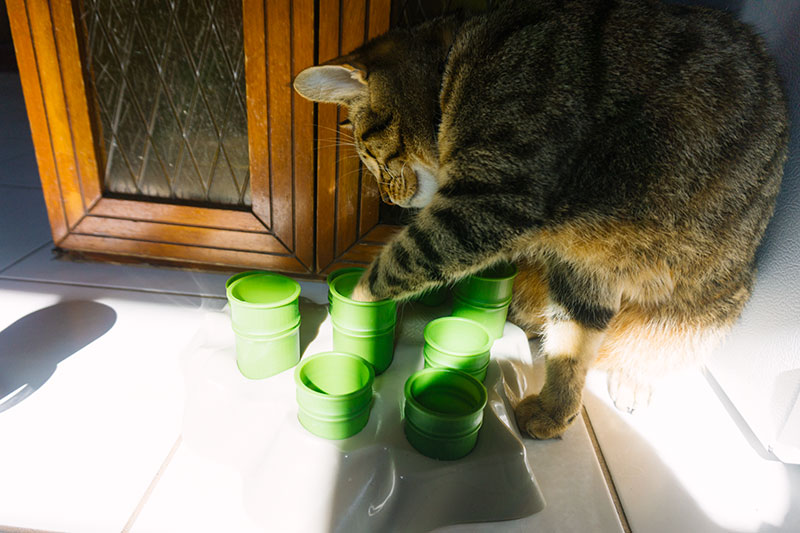You look up at the clock and figure that there’s still fifteen minutes left before your feline friend’s lunchtime so you sit back and relax and go back to what you were doing. But your feline isn’t too happy about this. They’ll try to convince you with every trick in the book. They might begin with the pleading, innocent looks directed towards you and progress to rubbing themselves on your legs or even pushing themselves between you and whatever it is that is distracting you from feeding them. However, if you’re immune to this behavior and are adamant about feeding your cat following a proper routine, they might change tactics. They might start yowling and running around the house acting all crazy. Either way, once the 15 minutes are over, you will have lost a bit of your sanity and your cat will be overexcited for their mealtime.
Once you’ve given your cat their meal and you begin walking away thinking your job is done, your ears pick up on a sound. There’s no mistaking it, your cat is gaging and you know by the time you make your way to them, they’ll have expelled out all the food you gave them! And will obviously expect more.
Why is my cat throwing up undigested food?
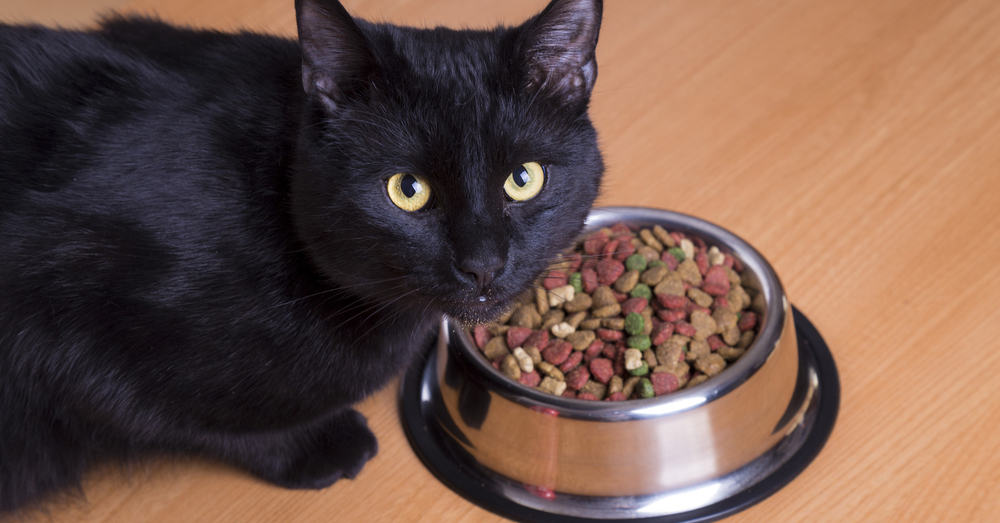
So why do our cats regurgitate their meals? What makes it difficult for them to digest their food and end up creating a mess for you to clean? Turns out there might be a few reasons for their behavior.
The most obvious reason is that they ate too fast. This is especially the case if you feed them dry food because these biscuits absorb water quickly, swell, and then send signals to the brain that the kitty has eaten way too much. The brain in response goes no problem, let’s just get rid of the food and the cat ends up with their regurgitation reflex being triggered. The point to be noted is that this is completely different from vomiting which is a more serious concern.
Another reason for your cat eating too quickly might be that they feel really hungry because the time between their meals might be too much for them and they are looking forward to their next week. It may also be linked to behavioral reasons as well; your cat just might be bored so gobbling up food might be a time pass for them.
If your kitty isn’t the only kitty in the house, they might also be chowing down on their food super-fast because they’re worried about their buddies stealing their food. Or they might be the greedy kitty who is acing to finish their food so they can steal the other kitty’s meal!
However, it is always a good idea to take your furry feline for a vet checkup especially if you notice changes in their eating. Sometimes, there is an underlying condition such as hyperthyroidism or diabetes which is causing your eat to have such an excessive appetite and making them gobble up their food at a quick pace. Linked with puking out what they ate, it might be a symptom that needs to be checked and treated.
Another reason why you should make sure to take your cat to the vet if they eat fast is that it may lead to obesity and subsequently a whole bunch of other health risks such as arthritis. Vets often suggest waiting it out a bit before giving your cat more food after they’ve vomited out their previous meal.
How to slow down my cats eating?
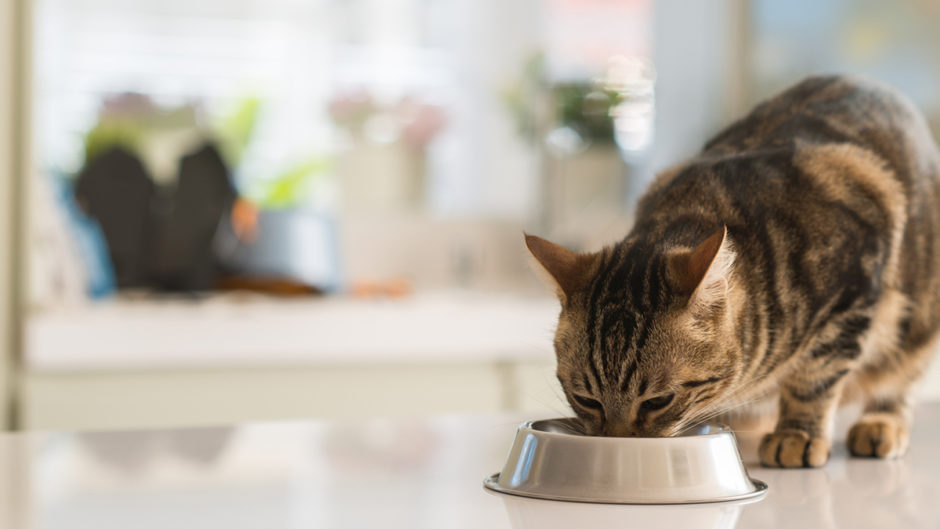
The good news is, you can take matters into your own hands and can work on slowing down your cat’s eating habits. This is how:
The first step would probably be to figure out what is being regurgitated. As disgusting as it sounds, this is important because if it’s one particular brand of cat food every time, you might want to replace it as it probably isn’t sitting too well with your cat. Similarly, if they keep vomiting dry food, you might want to switch the dry food out for wet tinned food which is equally if not more healthy for your cat. Other ways to slow down your cats eating pace include:
Invest in a slow feeding bowl
With your regular food bowls, your kitty can constantly chow down on her food without any pause. To avoid this, invest in a slow-feeding bowl that will make your cat work for their food and thus slowing them down. These bowls are designed with soft rubber spiked that hold onto the kibble and so to be able to eat, your cat has to push and then grab the food. This process will definitely slow them down.
Create your own slow feeder
It is understandable if you don’t want to invest in a slow feeder. The good news is that you can make one at home without having to make much effort. It’s simple, place an object such as a rock or a brick in the middle of the bowl you give your cat food in and pour the biscuits around it. That way your cat will have to work their way around to eat all that there is. This can work with both wet and dry food, just make sure whatever obstacle you place is clean.
Try turning feeding into a game
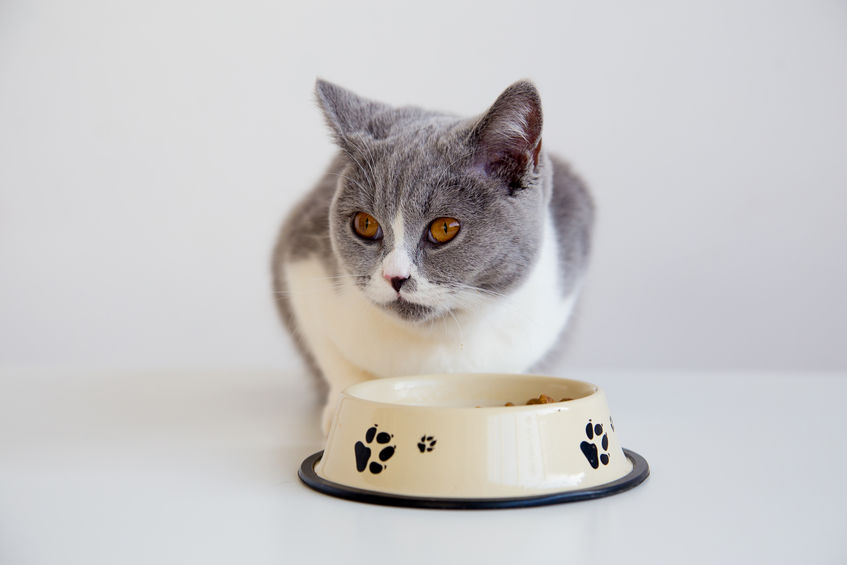
Many toys are available in the market that can be used to distract your kitty while they eat. That will also ensure that they are distracted and don’t gobble up their food too quickly. It will also give your cat a nice mental and physical workout!
Spread the food out
Another way to prevent fast eating is to place food in different bowls around the house in small quantities. Your cat will have to walk around to find and eat from the various bowls making her exercise and pace her eating out. If you don’t want your house to be smelling of cat food in different rooms, buy a muffin or cupcake tin and place the food in alternate domes so that your cat has to walk around to reach each one of them.
Squash the wet food
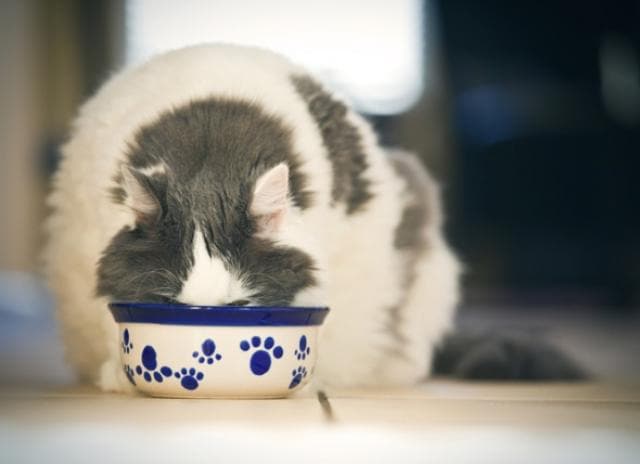
If you feed your cat wet food, try to mash it up rather than leaving it in big chunks. That way your cat will have to make the effort of licking it and thus they will ingest it slower. It will also ensure they take smaller bites of the food.
Add water
Whether it is dry or wet food, add a bit of water to the meal. It will take longer for your cat to eat the food because it will be heavier and it will also make them feel full quicker. Plus it will also keep your cat well hydrated.
Conclusion:
If you’re tired of constantly having to pick up your cat’s half-eaten meals off the floor then give these options a try. However, it also doesn’t hurt to consult with your vet about your cats eating habits to ensure everything is okay and there isn’t an underlying health problem that needs to be treated.
